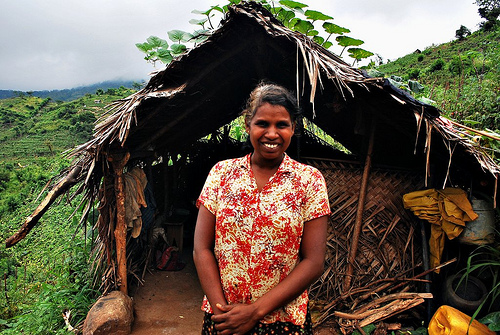
Rinse with green tea and keep your teeth happy. (Photo by Daria)
I've written before about the protective effects of green tea against dental caries. Several studies have shown that green tea helps tooth and gum health by reducing harmful bacteria, increasing enamel strength and inhibiting the breakdown of starch to sugar.
Black tea, cocoa and coffee protect against oral problems too, but green tea seems to be the most effective. A new study sheds more light on how drinking green tea improve oral defense mechanisms through oral peroxidases (OPOs) (link).
The two major defensive peroxidases of the mouth are salivary peroxidase (SPO) and myeloperoxidase (MPO). Their function depends partly on diet and probably also on genes.
In the abstract of the paper, the authors mention that their earlier study showed that elderly people who drank green tea for 3 months had higher levels of oral peroxidase activity than non-drinkers. In this study, they compared the effects of green tea on OPO in vivo and in vitro.
Adding a green tea infusion to saliva increased oral peroxidase activity by 280%, while black tea increased it by only 54%. Adding only epigallocatechin gallate (EGCG), the main polyphenol in green tea, increased activity by 42%. The effect was dose-dependent, which I assume here means that the stronger the tea, the greater the effect.
In human subjects, green tea gave a very similar result. Mouth rinsing with a green tea infusion resulted in a 268% increase in OPO activity. Thus, while green tea extracts may be more useful than just drinking regular green tea for some purposes, for dental health drinking and/or rinsing is probably the most effective way.
Note, however, that higher levels of salivary peroxidase don't necessarily mean better oral health; in fact, people with more dental caries and gingivitis tend to have higher SPO activity (link). My guess is that this is a defense mechanism against the harmful effects of excess hydrogen peroxide, which is excreted by oral bacteria. In other words, the stronger the attack, the stronger the defense.
In the case of green tea it seems that increasing SPO really does lead to better oral health, though.
For more information on green tea and dental health, see these posts:
Drinking 10 Cups of Green Tea Daily and Not Smoking Could Add 12 Years to Your Life
Green Tea Extract Enhances Abdominal Fat Loss from Exercise
Vegetable vs. Animal Sources of Vitamin A: Why Eating Carrots Isn't Enough
Genes, Diet and Oral Health: Why Do Some People Get Cavities and Others Don't?











